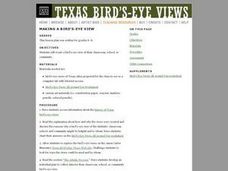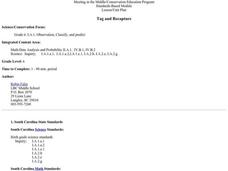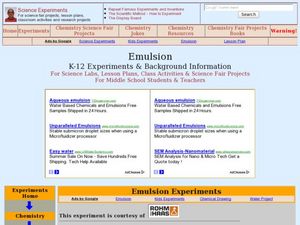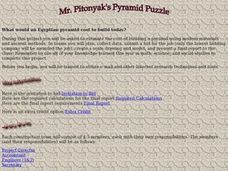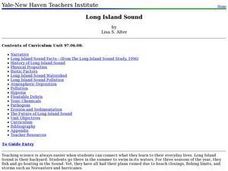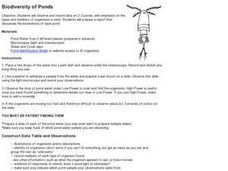Curated OER
How Do Plants Grow?
Students investigate plant growth. In this plant growth lesson, students investigate what would happen to plants if they did not have water and sunlight. Students conduct experiments to determine what plants need. Students create a...
Curated OER
Percents: What's the Use?
Students explore percentages in real world situations. In this percents instructional activity, students determine the final sales price after discounts. Students interview community members and determine how percentages are used in the...
Curated OER
Percents: What's the Use
Students research percentages in real world situations. In this percents lesson plan, students demonstrate their ability to apply percents to everyday situations. Students communicate mathematically by conducting interviews about...
Curated OER
Good News - We're on the Rise!
Students build and observe a simple aneroid barometer to discover changes in barometric pressure and weather forecasting. They graph changes in barometric pressure for two weeks and make weather predictions.
Curated OER
Structures and Behaviors of Planarians
Students investigate planaria of the phylum platyhelminthes. They use DigiScope technology to observe and describe the structure and movements of planarians.
Curated OER
Elbow Room - Exploring Population Density
In this population worksheet, students click on the links and research the internet about population, land, and government. Students answer 16 short answer questions including making spreadsheets.
Curated OER
Making a Bird's Eye-View
Students explore the bird's-eye views on the Texas Bird's-Eye Views website, and discuss why the views were created. They design and create a bird's-eye view of their classroom, school, or community.
Curated OER
Tag and Recapture
Sixth graders participate in an activity in which colored jelly beans represent fish in a lake--10 green jellybeans per "lake" representing tagged fish. They draw from the beans (fish) and record the number of tagged fish they draw...
Curated OER
What Shape is the Moon Tonight?
Young scholars understand that the moon appears differently throughout the month. In this phases of the moon lesson, students observe and record the phases of the moon.
Curated OER
Emulsions
Students identify the characteristics and composition of emulsions. In this chemistry lesson, students classify household products according to emulsion type. They explain how to make the best emulsion.
Curated OER
Mr. Pitonyak's Pyramid Puzzle
Students determine how much it would cost to build a pyramid using modern materials and ancient methods. They design scale drawings, models and submit final cost bids in an attempt to get the job of building a pyramid.
Alabama Learning Exchange
Pennies, Pennies and More Pennies
Learners determine the number of pennies needed to fill a room. In this pennies lesson plan, students work in groups to determine the number of pennies needed to fill a room. They compute the probability of the head of a pin...
Curated OER
Density
Students determine the density of different substances. In this physical science instructional activity, students rank them according to their density. They discover the relationship between volume and density.
Curated OER
Pollution Assessment: Is Wood Lake a Good Lake?
Students become aware of pollution in Richfield Minnesota's Wood Lake, identify sources of pollution in Wood Lake, learn to use variables, equations, spreadsheets and modeling software, and generate solutions for the problem.
Curated OER
A Trip to the Caribbean
Sixth graders use the World Wide Web to research information about the culture of these countries including the religion, types of food, climate, business and industry, and typical clothing of the people in the area.
Curated OER
Sliders - Static and Kinetic Friction
Students work in groups to conduct experiments the demonstrate the differences between static and kinetic friction. They consider how friction affects us in our everyday lives, determine the effects of weight on friction and complete a...
Curated OER
Long Island Sound
Students use the Internet to research the history of Long Island Sound. In groups, they identify the sources of point and nonpoint pollution and how humans are impacting the area. After watching a video, they discuss the role of...
Curated OER
TE Activity: The Beat Goes On
Students determine what the pulse is before examining how to measure the heart rate in different situations. They build a simple device that measures the heart rate, take heart rates, and record them on a worksheet. They discuss how...
Curated OER
Wind Power
Fourth graders develop an understanding of how engineers use wind to generate electricity. They will build a model anemometer to better understand and measure wind speed. They discover that engineers design wind turbines that generate...
Curated OER
Nonviolent Leaders
Young scholars compare the life of Gandhi and other nonviolent leaders. They identify qualities and behaviors of nonviolence. They synthesize the information they research about world leaders and the impact they had.
Curated OER
What's the Matter?
Students explore the components of matter. They discover what matter is, the states of matter, and how heat and cold cause it to change states in an online format. In addition, they complete internet-based lessons, activities, and quizzes.
Curated OER
Biodiversity of Ponds
Students study the biodiversity in pond water. In this biodiversity lesson plan, students observe 3 samples of pond water using a pond water identification sheet. They record their findings and identify the organisms they find, the...
Alabama Learning Exchange
The Moon
Young scholars explore the phases of the moon. In this solar system instructional activity, students listen to several books about the moon including The Moon Book by Gail Gibbons. Young scholars complete a KWL activity concerning the...
AIMS Education Foundation
Shifty Shapes
Shape shifters examine and experiment with pattern shapes. In this geometry lesson, they work in groups to name and describe pattern block shapes, and they discover the combinations of shapes that can be placed inside a hexagon.








